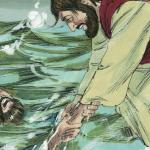The world is divided into two camps by the answer to this question: Is human failing finally tragic or therapeutic?**
If one omits the adverb, “finally,” of course, it is possible to believe that both the tragic and therapeutic provide windows into human behavior. One can believe that human failing is often tragic without excluding the therapeutic, and one can believe that therapy provides a window into human conduct without excluding the tragic.
But when the adverb, “finally,” comes into play, we are all forced to decide whether the tragic or the therapeutic assessment of the human condition is decisive. Or, to put it from the Christian point of view: “Do we need God to save us?” On that decision hinges our estimate of the human capacity for good and for evil, our understanding of healing and redemption, the way in which we understand our relationship to God and God’s hopes for humankind.
In our desire not to be thought of as fundamentalists, the vocabulary of “sin” has been missing for quite some time from both the pulpit and the seminary classroom. Lurid examples of “hell fire and brimstone,” the effort to find the roots of all suffering in some kind of sin, and the embittering lack of charity that fundamentalist preaching has sometimes displayed drives even some of the most sophisticated theologians to argue that the greatest cruelty can be explained by pointing to an absence of opportunity, failures in upbringing, or a deficit in education. That conviction has sifted heavily into our cultural consciousness.
Recently, for example, the last surviving prosecutor of the Nazi war criminals, Mr. Ben Ferenz, declared that, “War makes murderers out of otherwise decent people.”
The problem, of course, is that the logic of his argument overlooks the fact that war is, itself, the product of human choice. It is not a mute, random, and impersonal force. It also overlooks how the prejudices and cruelty reflected in the Holocaust drove the war and quickly found expression both in advance of and in the early years of World War II. Adolf Hitler, for example, developed plans for exterminating handicapped children and adults in 1939. By the summer of 1941, 70,000 men, women, and children were selected to die and lost their lives in one of six “clinics” scattered across Germany – gassed in the way that so many would be elsewhere in concentration camps. Clearly there were murderers before there was war.
As painful, unpleasant, and unwelcome as the task might be, then, it is the obligation of preachers to name our capacity for evil and the tragic nature of our existence. We are just no damn good. That tragic character is – thankfully — not the only truth about us as human beings and it does not explain the whole of our struggles. So, I am not suggesting that we focus exclusively on the tragic or that we return to “fire and brimstone” sermons of the past.
But we ignore the reality of evil and our need to be delivered from it at our peril. Our capacity for tragedy lies at the intersection of our lives and our God-given capacity for glory. Clergy who neglect that fact in favor of a happier, therapeutic narrative neglect a profound, if difficult responsibility to their congregations and humankind.
*Thanks to a student from long ago (whose name I’ve forgotten) for this turn of phrase.
** I owe the categories to someone that I’ve read along the way, but I can’t recall the source or find it.
Note: Karl Menninger’s book, Whatever Became of Sin?, published in 1973. Not much has changed. The book is still in print.

















